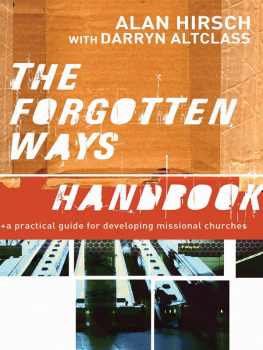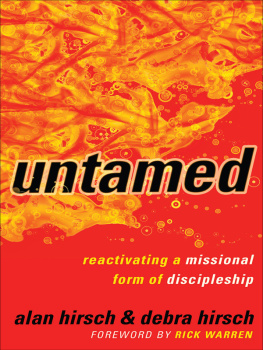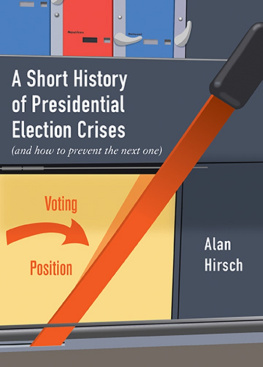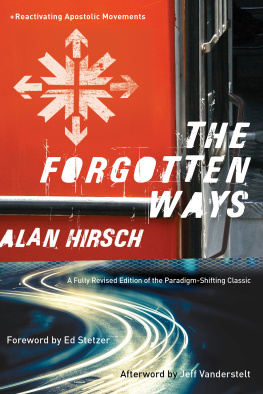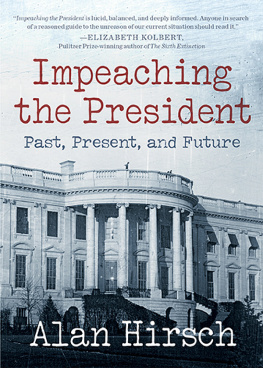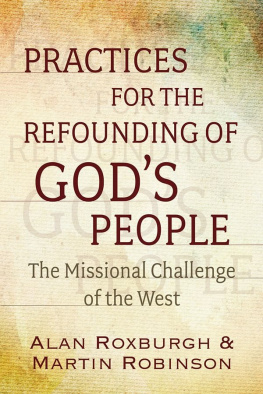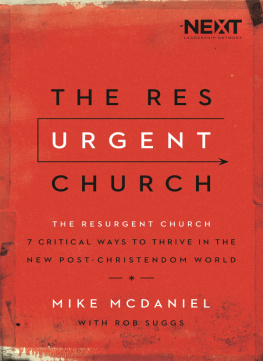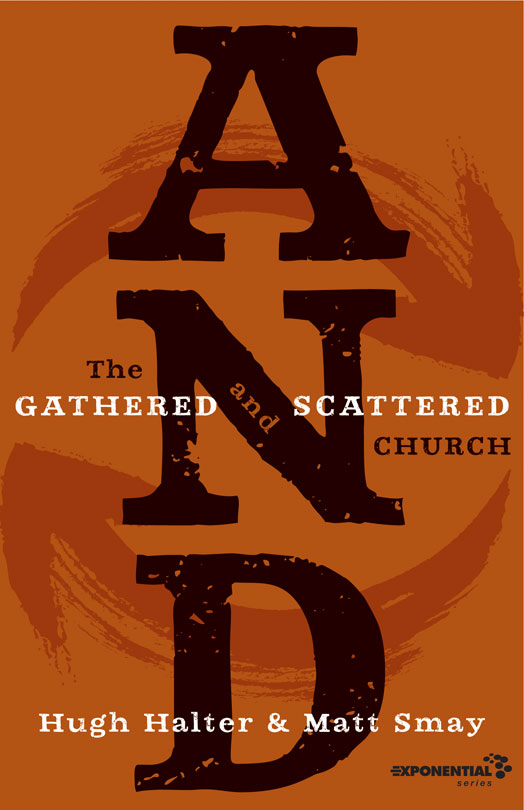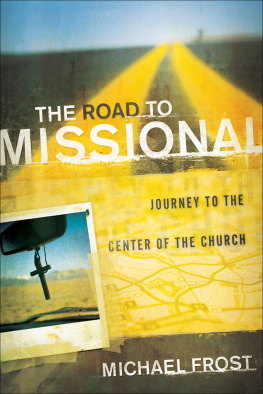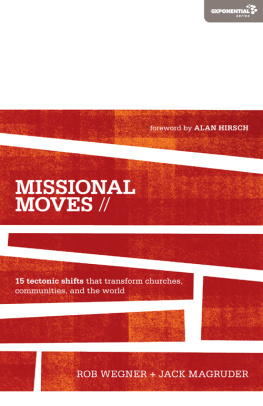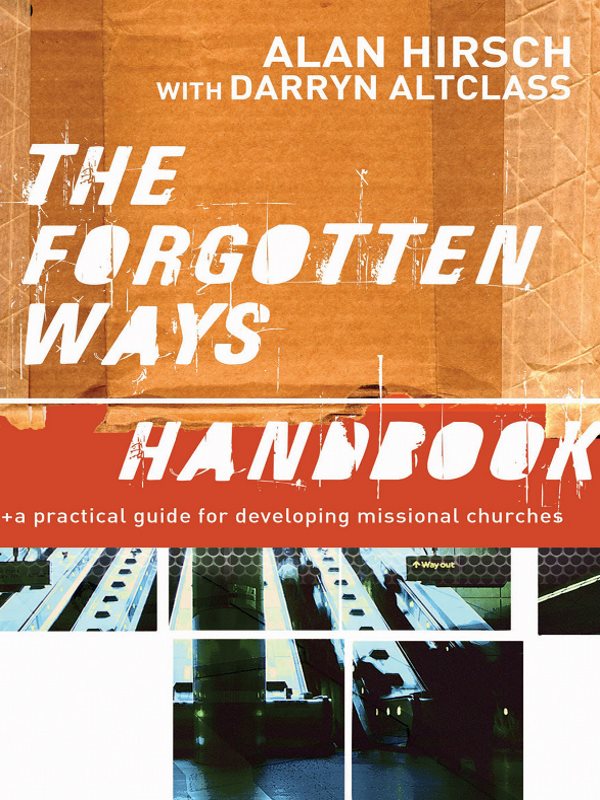
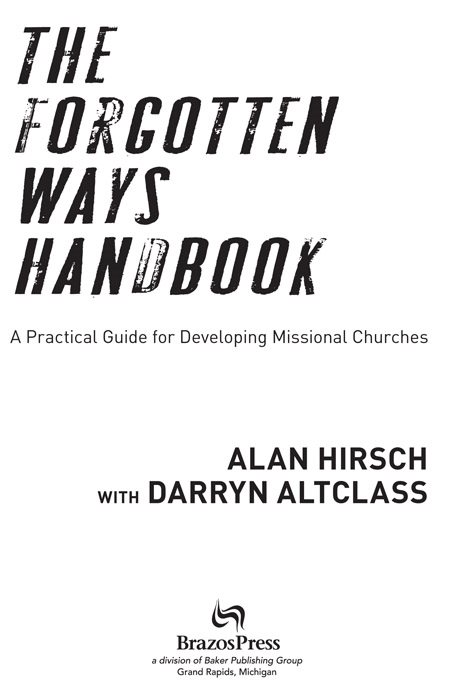
2009 by Alan Hirsch
Published by Brazos Press
a division of Baker Publishing Group
P.O. Box 6287, Grand Rapids, MI 49516-6287
www.brazospress.com
Ebook edition created 2011
All rights reserved. No part of this publication may be reproduced, stored in a retrieval system, or transmitted in any form or by any meansfor example, electronic, photocopy, recording without the prior written permission of the publisher. The only exception is brief quotations in printed reviews.
ISBN 978-1-4412-1272-6
Library of Congress Cataloging-in-Publication Data is on file at the Library of Congress, Washington, D.C.
The internet addresses, email addresses, and phone numbers in this book are accurate at the time of publication. They are provided as a resource. Baker Publishing Group does not endorse them or vouch for their content or permanence.
Praise forThe Forgotten Ways:
Hirsch has discovered the formula that unlocks the secrets of the ecclesial universe like Einsteins simple... formula (E=mc2) unlocked the secrets of the physical universe. There are some books good enough to read to the end. There are only a few books good enough to read to the end of time. The Forgotten Ways is one of them.
Leonard Sweet (from the foreword)
A full-blooded and comprehensive call for the complete reorientation of the church around mission. Nothing less than the rediscovery of a revolutionary missional ecclesiology will do for Alan Hirsch. A master work.
Michael Frost, coauthor of The Shaping of Things
to Come and author of Exiles
Every chapter has the kind of rich insight and inspiring challenge that we have come to expect from Alan Hirsch.
Brian McLaren, author of A New Kind of Christian, A Generous
Orthodoxy, and The Story We Find Ourselves In
The global mission community is indebted to Hirsch for this seminal book. It is packed with solid exegesis and theological reflection and provides a fresh reading of contemporary Christian authors and a careful evaluation of paradigm-shifting authors from the leadership field. There is rich insight in each chapter for field practitioners and a fresh synthesis of the essentials of biblical missiology.
Steve Hoke, Evangelical Missions Quarterly
A fascinating and unique examination of two of the greatest apostolic movements in history (the early church and China) and their potential impact on the Western church at the dawn of the twenty-first century. The book may well become a primary reference book for the emerging missional church.
Bill Easum, Easum, Bandy & Associates
(www.easumbandy.com)
It is refreshing to read a book related to the missional church that provides theological depth coupled with creative thinking. The ForgottenWays helps to rescue the concept of church from the clutches of Christendom, setting it free to become a dynamic movement in place of a dying institution.
Eddie Gibbs, coauthor of Emerging Churches: Creating Christian
Community in Postmodern Cultures and author of LeadershipNext:
Changing Leaders in a Changing Culture
The Forgotten Ways represents the potential that the emergent movement has for the renewal of the whole church.... There is very little to disagree with and much to celebrate in this book. Church leaders who desire to mobilize their people for genuine transformational ministry in this postmodern age need to read it.
Al Tizon, Prism
[Hirschs] reflections are worth reading, reading again and most importantly acting upon. The Forgotten Ways is a welcome and significant addition to the literature on mission to the West written by a leading missiological strategist. It will prove to be a useful tool to help shape new forms of missional churchfor church planters, those leading change in existing churches and all mission-hearted followers of Jesus.
Darren Cronshaw, Journal of the American Society
for Church Growth
This book is dedicated to
The many marvelous churches and organizations that I work with that are willing to systematically appropriate Apostolic Genius for the sake of the gospel in the West. You are the heroes at the frontline.
My shapevine.com buddies for being willing to innovate and pay the price.
The Warren family for taking the nomadic Hirsches into their lives.
Third Place Communities for being such fantastic guinea pigs.
Al and Lisa Dobson for adopting and embracing our beloved boxer Ruby.
Alan
Corry, my best friend, for giving me the space for projects like this.
The TPC crew for your companionship, commitment, and trust. The words I write and stories I tell are yours as well, forged from the years weve been together in mission.
Darryn
Special thanks to
Steve Ogne for adding to the content
and helping guide the outcomes.
Contents
As I write this preface, The Forgotten Ways has been out for around fifteen months. I can say that I have been genuinely humbled by the positive reception it has received. As an author I receive a lot of feedback through letters and e-mails or in person, and the nature of the feedback varies significantly. But by far the most common response I get from readers is, I know this sounds strange, but I feel that I kind of remember these ideas even though I have never been able to fully articulate them. At which point I usually say hallelujah, because for me it is an affirmation of the whole idea behind The Forgotten Ways that Apostolic Genius lies latent in all of Gods people, and we have simply forgotten how to access it. We have become so numbed by the opiate of institutional religion that we have simply lost contact with the memory of what we can, and ought, to be. Another reason for my elation is that I believe the Spirit is indeed waking his people up to their hidden potential all across the world. The new emergence of apostolic movements is a global phenomenon, as far as I can tell, and it really is quite remarkable. We have cause for great hope.
But yet another response usually comes in the form of a question: How can the ideas in The Forgotten Ways be implemented? Most readers find themselves in organizations that feel worlds away from the movement ethos described in the book, even though they long to move in that direction. It is important to know that in writing The ForgottenWays I never intended to develop a missional technique, but rather to awaken a lost imagination. We must go deep into our collective memories as Gods people and remember the forgotten ways of apostolic movements. We need to think and dream and have our imaginations charged with possibilities and our hearts inspired by Jesus afresh. This workbook is not meant to short-circuit that much-needed recalibration, but rather to operationalize it.
To do this I needed some help. So I invited Darryn Altclass, a longtime friend and colleague, to write this book with me. Darryn is a dedicated and very savvy church planter who has consistently implemented much of the content of The Forgotten Ways into real-life practice over many years. He knows me well; we have worked closely together in Forge Mission Training Network and have shared many missional ideas and dreams together over the years. As a local movement pioneer, Darryn initiated Third Place Communities, which we use as the primary test case in the book. We have chosen this network not because of any supposed superiority, but simply because we have both traveled with it over the past few years as they have tried to integrate, with some degree of success,
Next page
